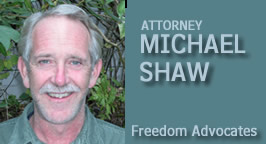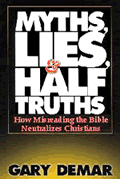Other
Shaw
Articles:
How
America
is Being
Sovietized
WHAT
IS PRIVATE PROPERTY?
PART 4 of 4
By Michael Shaw
October 28, 2006
NewsWithViews.com
Private Property and Ecological Health
Freedom associates authority with responsibility.
In a society that respects individual liberty and private property, a property owner has every incentive to use his property wisely and well. For example, a forestland owner’s interest is served by pursuing a healthy future condition in his forest. He can derive a livelihood from his land over time only by safeguarding its long-term stability and productivity. He must implement the measures to protect his investment and retain the interest of others in the wood his forest produces. Foresters make it their business, for instance, to understand the cost of soil erosion, and they are in the best position to abate it.
Left
to his own self-interested devices, the forester may become a wealthy
man. Sustaining his wealth  depends
on sustaining its source, the forest he owns. Other people may use his
products to carry out their own ventures, earning wealth of their own
by supplying timber and paper to a market eager for quality goods. The
wealth that such voluntary trade creates gives rise to the market demand
for ecological health. The forester knows that neither he nor those he
supplies have any interest in a forest denuded of trees.
depends
on sustaining its source, the forest he owns. Other people may use his
products to carry out their own ventures, earning wealth of their own
by supplying timber and paper to a market eager for quality goods. The
wealth that such voluntary trade creates gives rise to the market demand
for ecological health. The forester knows that neither he nor those he
supplies have any interest in a forest denuded of trees.
Free enterprise seeks and achieves the objective of ecological health, as Liberty Garden also demonstrates. There, a former weed lot now supports a wild wonderland with a plethora of productive native plants, which in turn support an array of indigenous species. Like the forester’s land, Liberty Garden proves that if people are free to create voluntary associations, the laws of economics and the consequence of stewardship will cause the earth to improve. What’s good for the property owner who remains free to pursue his enlightened self-interest is also good for the earth.
The government can undermine or prevent these good things when it assumes the roles of land manager and species savior — roles in which it has repeatedly failed. For instance, the Endangered Species Act (ESA) has made species protection a government monopoly, turning problems that have viable solutions into crises that could become nearly insurmountable to resolve. Liberty Garden illustrates how the ESA works against the very goals it has proclaimed. The central principle of land management at Liberty Garden is human control over seed-bank production. We eliminate seeds from non-native or aggressive native plants before they become viable, and we nurture the seed-banks of desired native plants. ESA regulation compromises and complicates this enterprise and devastates the economic value that would normally have resulted from the land’s improvement. Such regulations discourage seed-bank management and cause the desirable native seed-bank to die out. The unanticipated consequences of the ESA extend even further. The ESA places in government hands absolute use and management authority over private property when a listed species is found.
Claiming authority at Liberty Garden, the government has prohibited—through obfuscation—commercial human use and peaceful trade there. Lost are the mutual benefits and societal gains that otherwise would have occurred. At risk are the abandonment of Liberty Garden and the creation of other stewarded landscapes. After all, few would choose to invest time, money, and effort to create a dynamic wild habitat at the risk of federal ESA enforcement or a taking of use by a local planning bureaucracy. Such government actions erode the moral foundation of human stewardship by taking the private property on which that foundation rests.
If government continues to take authority over land management, achievement of human values (including ecological health) will remain elusive. This is why the institutions of private property and individual liberty must be protected now.
In place of the achievement that corresponds with self-interest, the mutual benefit that results from voluntary and peaceful trade, and the societal gains that flow from both, the enforcement of the ESA delivers to the ecology and to society what force brings—degradation and the consequent loss of human happiness and peace.
To be who you are, to own your own self and the product of your energy, and to possess the authority and the responsibility for your actions are the foundations for your pursuit of happiness. A society with an increasing aggregation of happiness promotes peace and rising prosperity. Such a society pursues the ideals and the institutions of individual liberty, i.e. private property.
Now is the Time
This
is the best of times and the most threatened of times. It is the best
because private property and the productive activity it fosters have brought
to  Americans
longer lives and broadened opportunities. It is the most threatened because
the collectivization of property is occurring at an increasing rate. The
trend is ominous. As factions intensify their struggle for government
favor and as the size of government grows, little seems to be gained.
But one thing is certainly lost: individual liberty.
Americans
longer lives and broadened opportunities. It is the most threatened because
the collectivization of property is occurring at an increasing rate. The
trend is ominous. As factions intensify their struggle for government
favor and as the size of government grows, little seems to be gained.
But one thing is certainly lost: individual liberty.
|
Subscribe to the NewsWithViews Daily News Alerts! |
At present, every county in America is implementing the United Nations land-use agenda directed by federal government agencies. This agenda calls for the ultimate elimination of private property and the replacement of the United States Bill of Rights by an authoritarian grant of “human rights.” As this initiative gains strength, it is wise to recall what George Washington said: “Private property and freedom are inseparable.” Freedom and a healthy planet are also inseparable. The expression at Liberty Garden is a symbol of these ideas.
Now is the time for all good men to come to the aid of liberty.
Click here for part -----> 1, 2, 3,
© 2006 Michael Shaw - All Rights Reserved
Sign Up For Free E-Mail Alerts
E-Mails
are used strictly for NWVs alerts, not for sale
Michael Shaw is a founder and director of Freedom 21 Santa Cruz and is a frequent host of the nationally syndicated Freedom 21 Santa Cruz Radio Show. He holds degrees in Political Science and Law and has practiced as an attorney and as a Certified Public Accountant. For 20 years he has implemented Abundance Ecology land management techniques on land he owns on the central coast of California. His success at creating an indigenous plant wonderland is unparalleled. Details are available at www.LibertyGarden.com.
More information on the Nature Conservancy and Sustainable Development (research documents, subject topic articles, radio archives, neighborhood tools to counter Sustainable Development and free subscription to The Report) is available at www.f21sc.net
Web Site: www.freedom21santacruz.net/
E-Mail: MichaelShaw@LibertyGarden.com
By contrast, in a socialist system, the government owns the means of production. There is no such thing as private enterprise. If you come up with a way to build a better mousetrap, the government owns the wood and wire...











